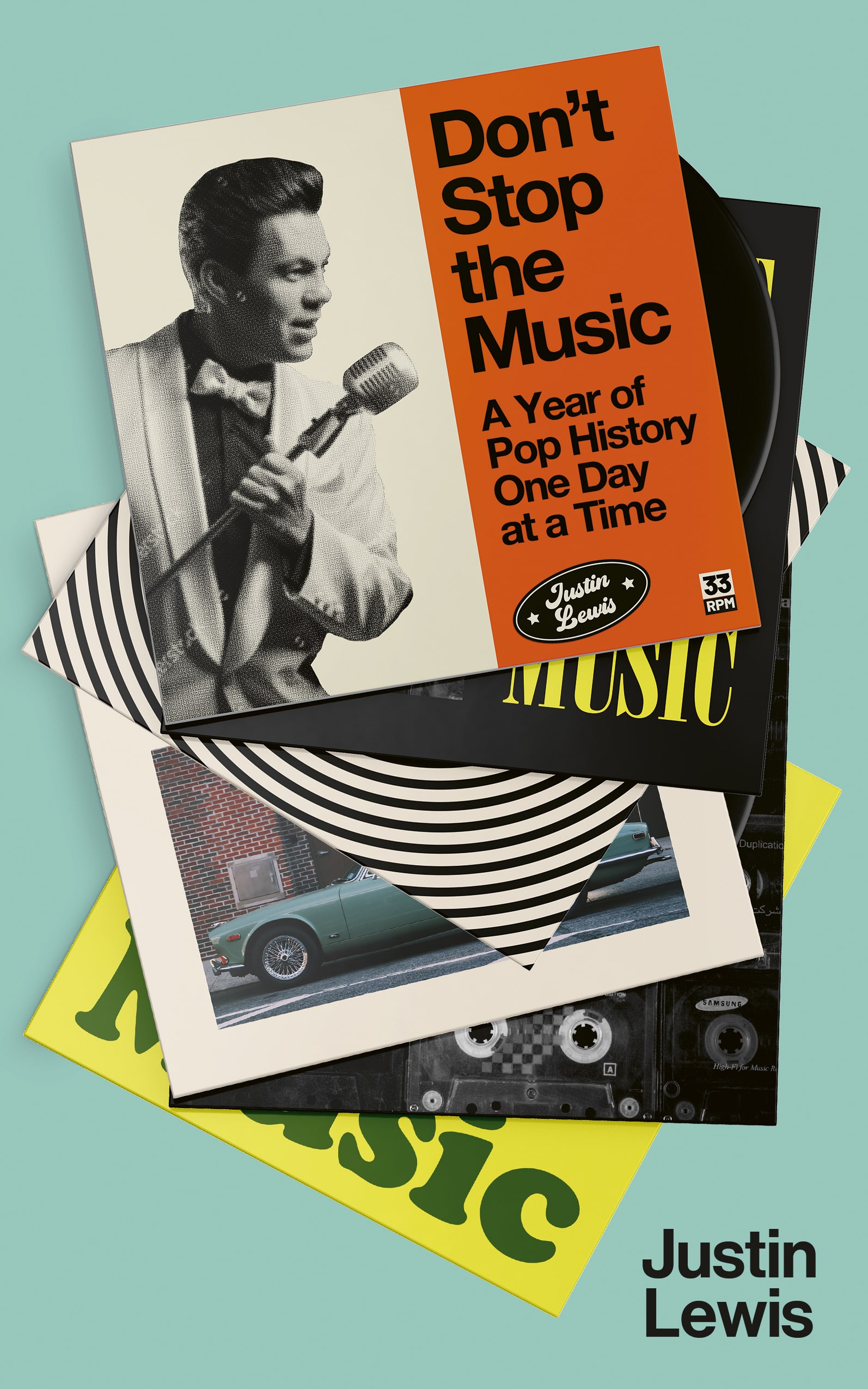Justin Lewis: Don't Stop the Music - A History of Pop Music, One Day at a Time review - deft and delightful pop almanac | reviews, news & interviews
Justin Lewis: Don't Stop the Music - A History of Pop Music, One Day at a Time review - deft and delightful pop almanac
Justin Lewis: Don't Stop the Music - A History of Pop Music, One Day at a Time review - deft and delightful pop almanac
A history of pop told through daily capsules of fact

This splendid book proves that trivia need not be trivial, and that a miscellany of apparently disconnected facts can cohere, if done well. It is in the proud lineage of the “toilet book”, a form sadly in decline in these days of the smartphone. Although modest in its ambitions, it provides entertainment, enlightenment and a sense of serendipity, transcending its bullet-point format to be more than the sum of its parts.
Justin Lewis has set out to tell a history of pop music not chronologically, but day by day from 1 January to 31 December, uncovering important – or sometimes delightfully unimportant – things that happened on those days across the years. Although he has been very even-handed in making sure all era and genres are well-represented, Lewis’s strong point is the 1980s, and his references to Sigue Sigue Sputnik, Lloyd Cole and the Commotions and Tears for Fears catch the character of that decade.
Although whimsical, Don’t Stop the Music is painstakingly researched and scrupulously presented. Lewis is a stickler for accuracy: song titles, dates of release and dates of chart positions are rendered with a badger’s perfectionism. I longed to catch him out but didn’t notice anything I could fault. But his research is worn lightly, and what comes over is only a pleasure in sharing his discoveries. The sense of randomness could, in other hands, have been frustrating, but instead is one of the main sources of pleasure. The juxtaposition, on 30 April, of Elvis recording “Jailhouse Rock” (1957), Rock Against Racism being founded (1978) and Celine Dion winning Eurovision for Switzerland (1988) is just one example of many.
 Most of the entries are short – some no more than a sentence, the longest no more than a page – and Lewis’s laconic style throws up some gems. “For ‘Tired of Waiting for You’… Ray Davies revisited a melody from his time studying at Hornsey School of Art – but had to write new words as he had forgotten the original ones.” Or: “1981: Prince performs his first-ever British concert… Among those watching is comic performer, naturalist and funk enthusiast Bill Oddie.”
Most of the entries are short – some no more than a sentence, the longest no more than a page – and Lewis’s laconic style throws up some gems. “For ‘Tired of Waiting for You’… Ray Davies revisited a melody from his time studying at Hornsey School of Art – but had to write new words as he had forgotten the original ones.” Or: “1981: Prince performs his first-ever British concert… Among those watching is comic performer, naturalist and funk enthusiast Bill Oddie.”
There are many stories I could quote, but don’t want to steal Lewis’s thunder by revealing his best bits here. Suffice it to say I now know more about the connection between Micky Dolenz, Paul McCartney and Alf Garnett, or what links “Space Oddity” with Clive Dunn’s “Grandad”, or the identity of the rock legend who was the unlikely support act for The Monkees in 1967.
Lewis acknowledges that people will check out their own birthday first – I had no idea I was born on such an uninspiring day, although it did lead me to the counterintuitive revelation that Cliff Richard’s “Summer Holiday” was released in early February. But while this might seem a book to dip into – and that would be a perfectly good way to do it – reading it straight through also works. Since there is haphazardness built into the book’s DNA, you get the mosaic effect either way.
One of the big themes that emerges is how, for 40 years or more, the weekly charts gave a narrative to the world of pop music: who was up, who was down, who was new, who was on the way out. It also gave a way of statistically quantifying achievements: records sold is so much more concrete a thing than streams. I wonder if the loss of this chart narrative in recent years, along with the universal availability of pretty much all the songs in this book at the swipe of a phone screen – thus losing the “essence of now” that was what pop was all about – means the death of pop music in the way we understood it? Perhaps, but this book, chockful of chart-lore, is a monument to the times when pop mattered and legends could be incubated in the bedrooms and youth clubs of Britain.
- Don't Stop the Music: A Year of Pop History, One Day at a Time by Justin Lewis (Elliott & Thompson, £16.99)
- More book reviews on theartsdesk
rating
Explore topics
Share this article
The future of Arts Journalism
You can stop theartsdesk.com closing!
We urgently need financing to survive. Our fundraising drive has thus far raised £49,000 but we need to reach £100,000 or we will be forced to close. Please contribute here: https://gofund.me/c3f6033d
And if you can forward this information to anyone who might assist, we’d be grateful.

Subscribe to theartsdesk.com
Thank you for continuing to read our work on theartsdesk.com. For unlimited access to every article in its entirety, including our archive of more than 15,000 pieces, we're asking for £5 per month or £40 per year. We feel it's a very good deal, and hope you do too.
To take a subscription now simply click here.
And if you're looking for that extra gift for a friend or family member, why not treat them to a theartsdesk.com gift subscription?
more Books
 'We are bowled over!' Thank you for your messages of love and support
Much-appreciated words of commendation from readers and the cultural community
'We are bowled over!' Thank you for your messages of love and support
Much-appreciated words of commendation from readers and the cultural community
 Natalia Ginzburg: The City and the House review - a dying art
Dick Davis renders this analogue love-letter in polyphonic English
Natalia Ginzburg: The City and the House review - a dying art
Dick Davis renders this analogue love-letter in polyphonic English
 Tom Raworth: Cancer review - truthfulness
A 'lost' book reconfirms Raworth’s legacy as one of the great lyric poets
Tom Raworth: Cancer review - truthfulness
A 'lost' book reconfirms Raworth’s legacy as one of the great lyric poets
 Ian Leslie: John and Paul - A Love Story in Songs review - help!
Ian Leslie loses himself in amateur psychology, and fatally misreads The Beatles
Ian Leslie: John and Paul - A Love Story in Songs review - help!
Ian Leslie loses himself in amateur psychology, and fatally misreads The Beatles
 Samuel Arbesman: The Magic of Code review - the spark ages
A wide-eyed take on our digital world can’t quite dispel the dangers
Samuel Arbesman: The Magic of Code review - the spark ages
A wide-eyed take on our digital world can’t quite dispel the dangers
 Zsuzsanna Gahse: Mountainish review - seeking refuge
Notes on danger and dialogue in the shadow of the Swiss Alps
Zsuzsanna Gahse: Mountainish review - seeking refuge
Notes on danger and dialogue in the shadow of the Swiss Alps
 Patrick McGilligan: Woody Allen - A Travesty of a Mockery of a Sham review - New York stories
Fair-minded Woody Allen biography covers all bases
Patrick McGilligan: Woody Allen - A Travesty of a Mockery of a Sham review - New York stories
Fair-minded Woody Allen biography covers all bases
 Howard Amos: Russia Starts Here review - East meets West, via the Pskov region
A journalist looks beyond borders in this searching account of the Russian mind
Howard Amos: Russia Starts Here review - East meets West, via the Pskov region
A journalist looks beyond borders in this searching account of the Russian mind
 Henry Gee: The Decline and Fall of the Human Empire - Why Our Species is on the Edge of Extinction review - survival instincts
A science writer looks to the stars for a way to dodge our impending doom
Henry Gee: The Decline and Fall of the Human Empire - Why Our Species is on the Edge of Extinction review - survival instincts
A science writer looks to the stars for a way to dodge our impending doom
 Jonathan Buckley: One Boat review - a shore thing
Buckley’s 13th novel is a powerful reflection on intimacy and grief
Jonathan Buckley: One Boat review - a shore thing
Buckley’s 13th novel is a powerful reflection on intimacy and grief
 Help to give theartsdesk a future!
Support our GoFundMe appeal
Help to give theartsdesk a future!
Support our GoFundMe appeal
 Jessica Duchen: Myra Hess - National Treasure review - well-told life of a pioneering musician
Biography of the groundbreaking British pianist who was a hero of the Blitz
Jessica Duchen: Myra Hess - National Treasure review - well-told life of a pioneering musician
Biography of the groundbreaking British pianist who was a hero of the Blitz

Add comment